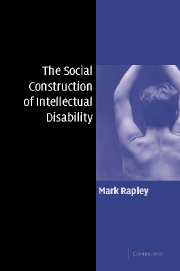Book contents
- Frontmatter
- Contents
- Acknowledgements
- A note on the cover illustration
- A note on transcription notation
- Introduction
- 1 A discursive psychological approach
- 2 Intellectual disability as diagnostic and social category
- 3 The interactional production of ‘dispositional’ characteristics: or why saying ‘yes’ to one's interrogators may be smart strategy
- 4 Matters of identity
- 5 Talk to dogs, infants and …
- 6 A deviant case (written with Alec McHoul)
- 7 Some tentative conclusions
- Appendices
- References
- Index
6 - A deviant case (written with Alec McHoul)
Published online by Cambridge University Press: 20 October 2009
- Frontmatter
- Contents
- Acknowledgements
- A note on the cover illustration
- A note on transcription notation
- Introduction
- 1 A discursive psychological approach
- 2 Intellectual disability as diagnostic and social category
- 3 The interactional production of ‘dispositional’ characteristics: or why saying ‘yes’ to one's interrogators may be smart strategy
- 4 Matters of identity
- 5 Talk to dogs, infants and …
- 6 A deviant case (written with Alec McHoul)
- 7 Some tentative conclusions
- Appendices
- References
- Index
Summary
Who are the mental defectives?
(Wechsler, 1958: 49)At one stage in his lectures Sacks (1992: 312–19) addresses the issue of ‘omni-relevant devices’ for categorising persons. He refers in particular to devices that contain pairs of categories such as THERAPIST + PATIENT(S) and TEACHER + STUDENT(S). By ‘omni-relevant’ he does not intend that any given person carries with them, at all times, incumbency in that device. Hence, because one is a therapist (for certain purposes) that does not mean that belonging in that category (from the paired device) would necessarily be relevant at, say, a barbecue or a concert. What it does mean is that, in particular, in therapy sessions, that one is the therapist and the others are the patients is a classification of persons that can be invoked, depended upon and hearably mentioned or implied under pretty much any circumstances during such sessions. That is, along with other such categorisation devices, even the ‘omni-relevant’ varieties are locally occasioned, and indeed may be indirectly proposed (see, for example Gerald and Will's management of the omni-relevance of the NOT-STAFF + NOT-CLIENT device in chapter 5).
- Type
- Chapter
- Information
- The Social Construction of Intellectual Disability , pp. 181 - 195Publisher: Cambridge University PressPrint publication year: 2004



